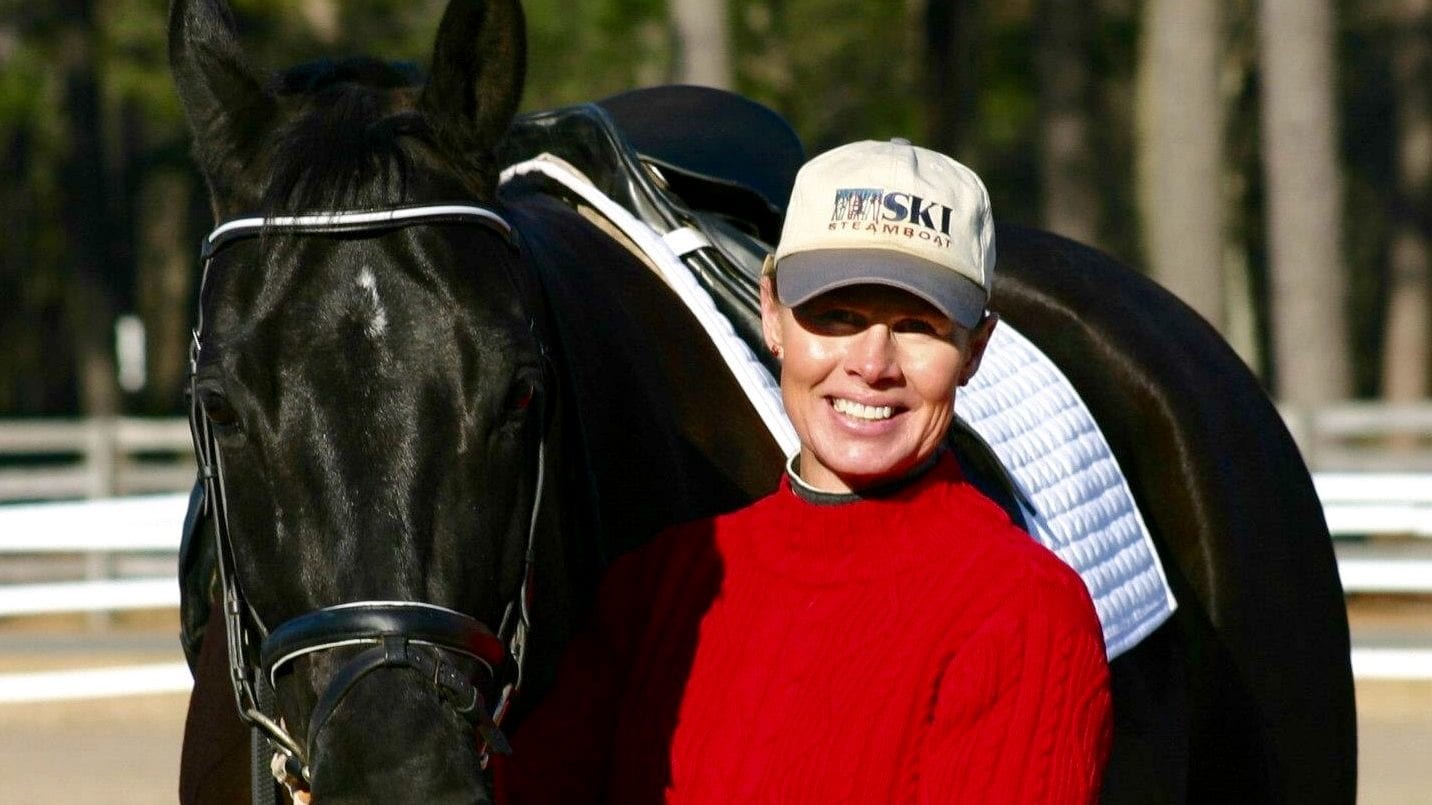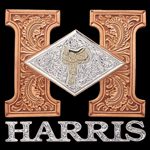In June, I was honored to be a part of the National Snaffle Bit Association (NSBA) “Boot Camp” hosted by St. Andrews University in Laurinburg, NC. Participants consisted of AQHA and APHA youth and amateurs as well as 4-H youth and Interscholastic Equestrian Association (IEA) team members.
Throughout the event, I enjoyed listening to several World and Congress Champions share their knowledge as clinicians who inspired me to share my thoughts on how doing your homework will help you succeed with everything in life.
While the focus of this article is to show how doing your homework before stepping into the arena will help you become a successful rider and competitor, much of this advice can be applied to most everything in life.
I can easily say I am a product of AQHA. I grew up showing successfully as a youth competitor and have been judging for thirty years. In 2008, I was named the AQHA Professional Horsewoman of the Year. Spanning twenty-five years I taught at three different collegiate equestrian programs; The University of Georgia, Colorado State University, and St. Andrews University, respectfully. From these experiences I have found that doing your homework before showing is essential to finding success in the show arena.
1) Fitness
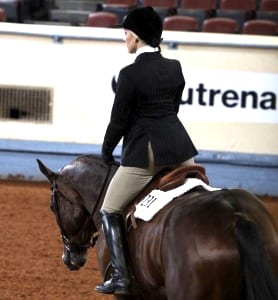 Now I know what you are doing, rolling your eyes. Eating right, exercising more than just riding, and sleeping well, does make you “feel” good. However, to control your body and balance you have to be fit. To be fair to your horse, you have to be fit. I don’t mean you have to be skinny, no matter what your weight and size, you need to be fit according to your body type. There is simply no getting around it.
Now I know what you are doing, rolling your eyes. Eating right, exercising more than just riding, and sleeping well, does make you “feel” good. However, to control your body and balance you have to be fit. To be fair to your horse, you have to be fit. I don’t mean you have to be skinny, no matter what your weight and size, you need to be fit according to your body type. There is simply no getting around it.
Whether you want to hear it or not, in classes where your performance is judged, a fit rider is more effective. A fit rider controls their core strength and leg aids. Core strength controls the balance of your upper body and MOST important, your hands.
If you run as an athlete in the showmanship, you have to be fit. Exercising should absolutely be part of your homework. Not only will it help your riding and your success as a showman, but it is also a good life choice that can only serve you positively.
2) Know Your Passion
Obviously, first, it must be horses. Secondly, what really makes you get excited to ride? Or lead? As a youth, if you were like me, you just wanted to ride. Then, I wanted to ride in anything that had a pattern and I still do. Become educated in what you want to spend your time perfecting. Learning never stops and horses will take a lifetime to learn well.
Ask yourself: do you like going slow? Going forward? Jumping fences? Loping over poles? Maybe you like it all (and it helps when you have a horse that is versatile enough to keep up). Get lessons, get help and learn. Watch others, and read more. Studying and pursuing should be part of your homework.
3) Be All In
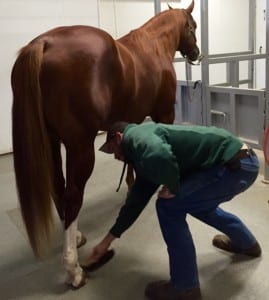 That is the best statement I have ever heard. One more time…BE ALL IN. Learn how to care for your horse in every way. This is an aspect of being a horseman that not everyone has an opportunity to learn. I always take for granted that my students know how to clean a stall, pick feet, polo wrap, standing wrap, poultice, groom correctly and thoroughly, put a blanket or fly sheet on correctly, etc.
That is the best statement I have ever heard. One more time…BE ALL IN. Learn how to care for your horse in every way. This is an aspect of being a horseman that not everyone has an opportunity to learn. I always take for granted that my students know how to clean a stall, pick feet, polo wrap, standing wrap, poultice, groom correctly and thoroughly, put a blanket or fly sheet on correctly, etc.
Do you know how much water your horse drinks? Do you know their tendencies in a stall and out in the pasture? Do you know how to band and braid? Basic horsemanship includes the care of the horse. The welfare of our animals should be most important. BE ALL IN when it comes to caring for your horse. Making sure your show partner is healthy and happy should be daily homework if you want to be a horseman and a showman.
4) Goals
Have goals. For some, the greatest dream is to be on the Olympic Team. Even if that dream is not very realistic, it can never hurt to have goals. Make a list of short-term and long-term goals, and then get to work. This practice will help you chart and follow a course to help build your journey.
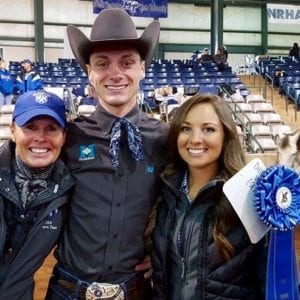 Short-term goals can be learning to change a lead correctly, learning to do a roll back, or as simple as learning to lope off in balance. Long-term goals might be showing at the All-American Quarter Horse Congress in two years or possibly even at the AQHA World Show. Depending on the training of your horse, it might take longer for the horse to mature and finish, but set a goal, a realistic goal, and set a time frame for completion.
Short-term goals can be learning to change a lead correctly, learning to do a roll back, or as simple as learning to lope off in balance. Long-term goals might be showing at the All-American Quarter Horse Congress in two years or possibly even at the AQHA World Show. Depending on the training of your horse, it might take longer for the horse to mature and finish, but set a goal, a realistic goal, and set a time frame for completion.
If your goals are unattainable at the time because of a certain limitation, set new ones and see if they can build towards your initial goals. It’s helpful to set a timeline to follow, but be flexible. Achieving your goals might not smooth all the time, remember you are working with a living creature. Just like you, your horse needs time to get stronger and more educated. Some goals will fit both you and your horse, and some won’t. Don’t be afraid of the challenge, but be reasonable and thoughtful of your horse. Working towards your goals is homework.
As a judge, especially in the pattern classes, I can see those who know their horses and who have really done their homework. It is more than luck that makes a showman successful.
5) Read the Rulebook
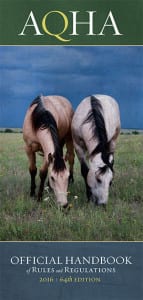 Before competing it is important for you to understand the criteria and rules of each class you enter. We as judges review criteria and rules. Before I judge my ritual is to read the rulebook—every time. This practice is especially important for events that have score sheets. As a competitor you have to know how you are being judged: what is desirable? What are the rules as written? What are the penalties? Knowing the rulebook will help you show more correctly. When I coach my reining students, they have to know penalty applications and read A General. A General is a detailed description in the rulebook that explains the ideal reining horse.
Before competing it is important for you to understand the criteria and rules of each class you enter. We as judges review criteria and rules. Before I judge my ritual is to read the rulebook—every time. This practice is especially important for events that have score sheets. As a competitor you have to know how you are being judged: what is desirable? What are the rules as written? What are the penalties? Knowing the rulebook will help you show more correctly. When I coach my reining students, they have to know penalty applications and read A General. A General is a detailed description in the rulebook that explains the ideal reining horse.
Horsemanship and equitation riders have to understand penalty applications so they can make the right choice in the arena: is missing a lead for three strides worse than a break at one stride? Just like before any other test, you must do your homework.
6) Mental Workouts
This practice can help you be better for any class, but I use it as a mainly for pattern work.
 Visualize—see the arena. Map out the pattern in the arena with visuals to help your layout.
Visualize—see the arena. Map out the pattern in the arena with visuals to help your layout.- Walk it on foot. Before any pattern work, my students run it on foot with cones. They walk, trot/jog, lope/canter, extend, whatever is called for on foot—accurately. I also make them talk through the pattern as they walk it, with arms in position and upper body in position. It gives me as a coach an idea of how they think and how they move. As a bonus, running in the sand is also a great indicator of fitness.
- No Negative. Talk through the pattern. Talk about the meat of it, about transitions that might be tougher and do so with a clear thought process. Make it positive. Over and over. Be so mentally prepared that no matter what comes up, you have a clear plan on how to handle it. Act and react with ease. For me, if you say anything negative, you owe me a dollar. Getting into the pocket book will end negativity quickly. Your homework is training you to manage any situation in a positive way.
7) Practice
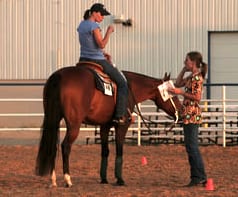 You have probably already heard the line, “Perfect Practice makes Perfect.” You have to practice because it is a partnership you are working on. Timing, “feel”, friendship, and confidence. It takes time and consistency to develop all skills, and it sometimes takes a lot of patience too.
You have probably already heard the line, “Perfect Practice makes Perfect.” You have to practice because it is a partnership you are working on. Timing, “feel”, friendship, and confidence. It takes time and consistency to develop all skills, and it sometimes takes a lot of patience too.
Some days you might ride for thirty minutes and everything feels perfect, and then some days it takes two hours. Some days it might feel like everything is not so perfect. You have to work at what you want to accomplish and remember to always try to end fairly and positively.
But remember: practice does not mean just drilling. You have to work with your horse, not just drill till he’s bored or frustrated. And believe me, judges can see if you have done your homework and practiced.
8) Equipment that fits
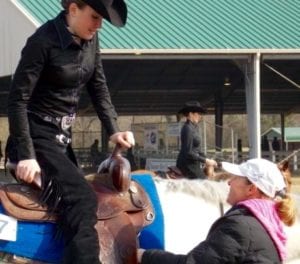 Equipment that fits your horse and fits you is vital to success. Your gear does not have to be the most expensive, but it does need to fit your horse and be comfortable for them. For yourself, make sure your saddle fits your size and shape.
Equipment that fits your horse and fits you is vital to success. Your gear does not have to be the most expensive, but it does need to fit your horse and be comfortable for them. For yourself, make sure your saddle fits your size and shape.
As a horsewoman, it makes me crazy to see a saddle that does not fit the horse’s back. Improper fitting tack will sore your horse. As a judge, it makes me crazy to see a saddle that is too small or too big for a rider. If you are unsure about proper fit, get help from a professional in the industry. Having the right fitting tack will make you and your horse much happier, helping to create a lasting partnership.
9) Clothes that Fit and Final Turn Out
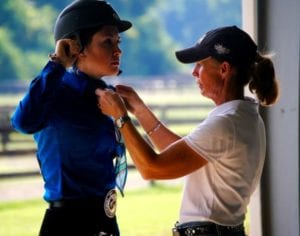 It is important to have clothes that fit your body shape and size and are in a color that is flattering. Make sure your hat is clean and blocked correctly, your boots are clean, and that your chaps fit and are long enough.
It is important to have clothes that fit your body shape and size and are in a color that is flattering. Make sure your hat is clean and blocked correctly, your boots are clean, and that your chaps fit and are long enough.
For hunter seat, make sure you have a helmet that fits on your head securely and that your boots are tall enough and shining. Looking professional shows RESPECT and knowledge for the class. Your homework is to know what is good for “your look” and finish.
10) Be Honest
We are all individuals. I have spent years working on learning to understand this truth. As a coach, I wanted everyone to be serious and live for horse shows. I thought this frame of mind was the only one to have. However, everyone might have a different reason for getting involved with showing, and it might not be your reason. Be kind and thoughtful, and be honest with yourself and to others you help. This homework you will always have.
About the Author: Carla Wennberg has been an AQHA judge for thirty 30 years. In 2008, Wennberg was the AQHA Professional Horsewoman of the year and has served on an AQHA committee for the past 15 years. She has been honored to judge 13 World Championship Shows, three AQHYA World Shows and three times at the All American Quarter Horse Congress. Wennberg has taught for 25 years at various equestrian programs across the country including University of Georgia, Colorado State University and currently at St. Andrews University.
Photos © Carla Wennberg and The American Quarter Horse Journal


